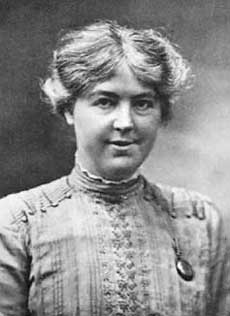Jessie Chrystal MacMillan 1872-1937
 Her parents sent her as a boarder to St Leonard's School in St Andrews in 1888. Then in 1892 was one of the first women admitted to the university of Edinburgh. She took a first class degree in Mathematics and Philosophy.
Her parents sent her as a boarder to St Leonard's School in St Andrews in 1888. Then in 1892 was one of the first women admitted to the university of Edinburgh. She took a first class degree in Mathematics and Philosophy.
After studying at the University of Berlin over the summer of 1896, she took various other courses, which gave her an MA in mental and moral philosophy in 1900.
In addition to her academic studies, while at university, she had played a major role in the Women's Debating Society, an activity which was to stand her in good stead.
After graduating Chrystal worked for the Scottish Federation of Women's Suffrage Societies, campaigning for women's right to vote. She was secretary to the Women Graduates of Scottish Universities Committee, which argued that members, as graduates, had the right to the parliamentary franchise within the University electorates, which returned four MPs.
At this time the Scottish Universities (St Andrews, Aberdeen, Glasgow and Edinburgh) elected four MPs to Parliament. Members of the General Councils of these universities formed the electorate, all 'persons' on the Councils having the right to vote. The word 'person' was used throughout the statutes. The General Councils consisted of the graduates of the four universities, and now many women were graduates. However, the women were denied the right to vote for the first general election in which the university seat of Edinburgh and St Andrews was contested in February 1906. Chrystal, along with other women, argued that women graduates were 'persons' and therefore allowed to vote in electing the university MPs.
As honorary secretary of the Women Graduates of the Scottish Universities (Parliamentary Franchise) Committee, Macmillan brought a court action in 1906 to argue that women graduates had the right to vote as 'persons' on the General Councils. The case was lost, and their appeal was dismissed. In 1908 the case was brought before the House of Lords, the final arbiter in legal matters. Chrystal Macmillan became the first woman to plead before the House of Lords.
As expected the case was rejected.
Why were women incapable of voting? In 1909 she gave a lecture tour of Scotland under the auspices of the Scottish University Women’s suffrage Union. She championed causes that supported equal citizenship for women throughout her life.
She, resigned the NUWSS on the outbreak of war. She was on the first boat to cross the North Sea taking a food convoy to Flushing after the fall of Antwerp. She became secretary of the Women’s International Committee for Permanent Peace.
After the war ended in 1918, Chrystal Macmillan was a delegate at the International Congress of Women in Zürich in May 1919 which issued a strong condemnation of the harsh terms imposed on Germany by the Treaty of Versailles. She presented these views to the 1919 Paris Peace Conference but, again her views were ignored. Looking back on these events with the benefit of hindsight, we can now see that her view has been shown to be right.
After the war she moved to London to carry on the fight for all adult women to vote. Women were mow able to join the legal profession, Chrystal joined as she felt that from this position she would be better able to advance the causes in which she believed. She entered the Middle Temple, and was called to the bar on 28 January 1924, one of the first women to be so.
In 1926 she founded the Open door council – this campaigned against legal restrictions on women’s employment. She sought equality in employment opportunities and campaigned to secure retention of British nationality for women married to foreign nationals. (This was not resolved until long after her death)
References:
Article by J J O'Connor and E F Robertson
Picture: public domain.
